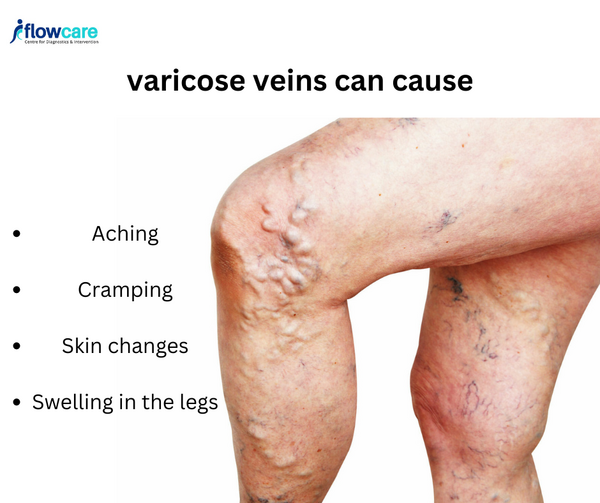Varicose veins, those twisted and enlarged veins that often appear on the legs, are not solely a result of genetic factors or aging. Lifestyle choices play a significant role in the development and exacerbation of varicose veins. Understanding these links is crucial for individuals seeking to prevent or manage this common vascular condition.
1. Sedentary Lifestyle:
Prolonged periods of sitting or standing without breaks can contribute to the development of varicose veins. A sedentary lifestyle hinders proper blood circulation, placing increased pressure on the veins, especially in the lower extremities. This heightened pressure weakens vein walls and valves, paving the way for the formation of varicose veins. Incorporating regular breaks for movement and exercise into daily routines is crucial to alleviate this risk and promote overall vein health.
2. Lack of Physical Activity:
Regular exercise is a key factor in maintaining good vascular health. Engaging in physical activities such as walking, swimming, or cycling helps promote blood flow, preventing the stagnation that can lead to the formation of varicose veins. These activities not only enhance circulation but also strengthen the calf muscles, crucial for the efficient functioning of the calf muscle pump. Additionally, exercise contributes to weight management, reducing the strain on veins and lowering the risk of obesity-related venous issues. Incorporating at least 30 minutes of moderate-intensity exercise most days of the week can significantly contribute to overall vascular well-being.
3. Obesity:
Carrying extra weight puts additional pressure on the veins, especially those in the legs. Obesity is often associated with varicose veins, as the increased pressure can weaken vein valves, leading to their dysfunction. The intricate relationship between excess weight and varicose veins delves into the profound impact that obesity can have on vascular health, especially in the lower extremities. The additional strain placed on the veins, coupled with the physiological changes associated with obesity, contributes significantly to the development and exacerbation of varicose veins. Addressing obesity becomes paramount in the holistic management of varicose veins. Weight loss interventions, including a combination of dietary modifications and increased physical activity, can alleviate the burden on veins, enhance cardiovascular health, and mitigate the progression of varicose veins. In the pursuit of healthier veins, individuals are encouraged to adopt lifestyle changes that contribute to both weight management and overall well-being.
4. Dietary Choices:
Diet plays a pivotal role in treatment of varicose veins, and specific dietary choices can impact the development and progression of varicose veins. Excessive salt intake heightens sodium levels, contributing to water retention and increased pressure on veins. In contrast, a fiber-deficient diet may lead to constipation, adding strain during bowel movements and influencing vein health. Embracing a holistic dietary approach, rich in antioxidants, vitamins, and minerals, supports overall vascular function. Balanced hydration and mindful selections, favoring fresh, whole foods, form the cornerstone of a proactive strategy to promote optimal vein health, reduce varicose vein risk factors and also help in varicose veins treatment .
5. High Heel Usage:
High heel usage poses potential risks to vein health, particularly in the lower extremities. The elevation of the heel alters the natural alignment of the body, placing increased pressure on the veins in the legs. This heightened pressure can impede blood flow, potentially contributing to the development of varicose veins. Moreover, the calf muscles may not function optimally in high heels, affecting the pumping of blood back to the heart. While occasional use may not be detrimental, prolonged and frequent high heel usage warrants consideration for its potential impact on vein health.
6. Clothing Choices:
Selecting appropriate clothing can play a role in managing varicose veins. Opting for loose-fitting, comfortable garments helps promote healthy blood circulation. Tight clothing, especially around the waist or thighs, can impede blood flow, potentially exacerbating vein issues. Supportive compression stockings or socks are practical choices, providing gentle pressure to aid venous return. As an integral aspect of lifestyle modifications, thoughtful clothing choices contribute to overall vein health, striking a delicate balance between style and the well-being of the circulatory system and it is necessary because clothing is also a factor of increased risk of varicose veins.
7. Smoking:
Smoking poses a significant threat to vascular health, including the increased risk of developing varicose veins. The harmful chemicals in tobacco smoke contribute to inflammation and damage to blood vessels, compromising their elasticity. This, coupled with the constriction of blood vessels caused by smoking, hampers proper circulation and may contribute to the formation of varicose veins. Quitting smoking is a crucial step toward improving vascular health, reducing inflammation, and mitigating the risk factors associated with varicose veins. Seeking support for smoking cessation can lead to lasting benefits for both cardiovascular and overall well-being.
8. Hormonal Changes:
Hormonal fluctuations, especially during pregnancy and menopause, play a pivotal role in the development and progression of varicose veins. Elevated levels of hormones like estrogen can weaken vein walls and valves, compromising their ability to efficiently circulate blood. Pregnancy-related changes, including increased blood volume and pressure, further contribute to vein enlargement. Similarly, hormonal shifts during menopause may disrupt the delicate balance within veins. Understanding the interplay between hormones and vascular health is crucial in addressing and managing varicose veins, offering insights for tailored interventions and preventive strategies.
9. Occupation:
Occupation encompasses the various roles and activities individuals engage in to earn a living or contribute to society. It extends beyond a mere job, encapsulating one's professional pursuits, responsibilities, and the impact on personal identity. Occupations range from traditional employment to entrepreneurial ventures, each shaping an individual's daily life and societal interactions. The diversity of occupations reflects the multifaceted nature of human endeavors, highlighting the unique skills, passions, and contributions that individuals bring to their chosen fields. Ultimately, occupation plays a central role in defining a person's connection to the broader community and their sense of purpose in the world.
10. Genetics:
Genetics, the study of heredity, plays a pivotal role in determining an individual's biological traits and susceptibility to various conditions. The intricate interplay of genes inherited from parents influences factors such as physical characteristics, health predispositions, and even responses to environmental stimuli. In the context of medical conditions like uterine fibroids or varicose veins, understanding genetic factors is essential for tailoring personalized approaches to diagnosis and treatment. Unraveling the genetic components of these conditions contributes to advancing medical knowledge, paving the way for more targeted interventions and, ultimately, improved healthcare outcomes.
In conclusion, understanding the link between lifestyle choices and varicose veins empowers individuals to make proactive decisions for their vascular health. Incorporating regular physical activity, maintaining a healthy weight, and making mindful choices in daily habits can contribute to the prevention and treatment of varicose veins. For those seeking treatment, nonsurgical procedures such as laser treatment offer effective and minimally invasive options under the guidance of experienced healthcare professionals in Jaipur.



